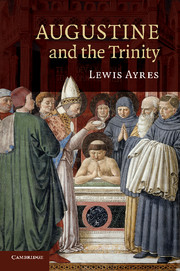Introduction
Published online by Cambridge University Press: 06 December 2010
Summary
Even as summary accounts continue to repeat the established caricatures of the past century, new readings of Augustine's Trinitarian theology grow in scholarly detail and density. These new readings, which have largely emerged over the past three decades, argue for new accounts of the fundamental dynamics of Augustine's Trinitarianism; they suggest new questions that we should ask if we are to study him well; they suggest new texts from his corpus as paradigmatic. Many of the older readings of Augustine's Trinitarian theology that have been displaced by this body of scholarship – and which, it must be noted, have not been extensively defended in the scholarly literature for many years – tended to view Augustine in highly negative fashion as the initiator of disastrous trends in Western Christian thought. Augustine was presented as marking a shift in the history of early Christian Trinitarianism, his own overly strong commitment to the divine unity partially being the result of his Neoplatonic engagements and strongly influencing those who came after him. This commitment led him away from the heritage of earlier Greek Nicene theology (and, in some readings, from earlier Latin theology). Even many of those who viewed Augustine positively – and saw his differences from his predecessors as merely delineating sets of complementary theological trajectories – operated with similar assumptions about his work. At the same time, his Trinitarian theology was engaged through an almost exclusive focus on the De trinitate.
Information
- Type
- Chapter
- Information
- Augustine and the Trinity , pp. 1 - 10Publisher: Cambridge University PressPrint publication year: 2010
